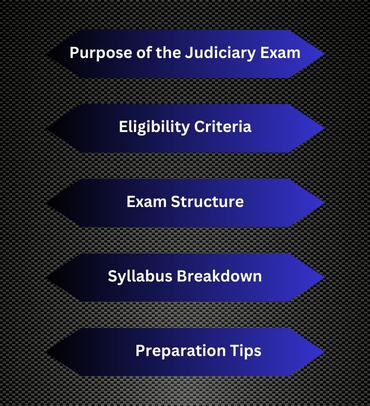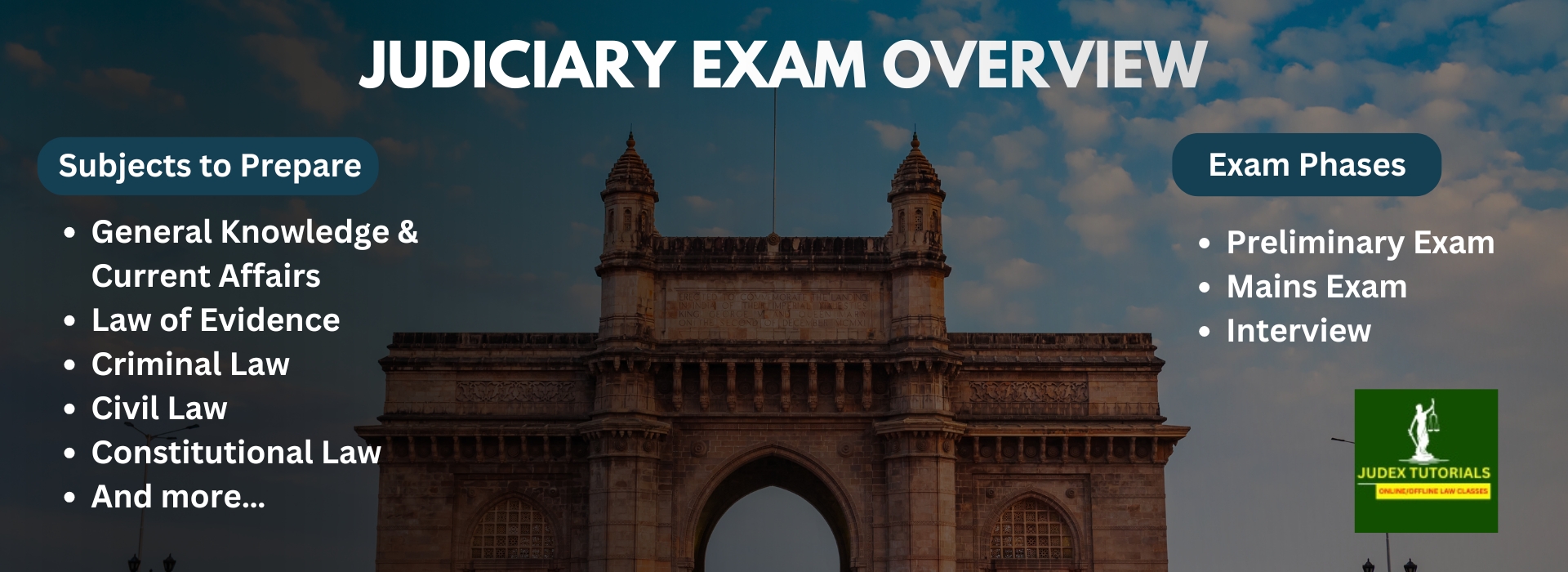.jpg)
Judiciary Exam Overview
The judiciary exam, often referred to as the Judicial Services Examination or Civil Judge Exam, is a crucial step for law graduates aiming to join the judicial system in India as civil judges or judicial magistrates. Each state’s Public Service Commission or High Court conducts its judiciary exams, which generally cover three main stages: Preliminary Examination, Main Examination, and Viva-Voce (Interview). This guide provides an overview of the judiciary exam, eligibility criteria, selection process, and preparation tips to help aspirants understand the path to a career in the judiciary.
Purpose of the Judiciary Exam
The judiciary exam is designed to recruit qualified candidates into the subordinate judiciary across various states. Those who pass this exam are appointed as judicial officers, playing a key role in the administration of justice at the district and state levels. Becoming a judge is a prestigious position that requires a deep understanding of the law, integrity, and a commitment to serving the public. With focused judicial service exam coaching, you can enhance your chances of acing the exam.

Eligibility Criteria
To qualify for the judiciary exam, candidates must meet specific educational and professional requirements:
- Educational Qualification: Candidates should hold a Bachelor of Laws (LLB) degree from a recognized university, either through a three-year or five-year integrated law course.
- Age Limit: Generally, candidates must be between 21 and 35 years old, although age requirements vary slightly by state.
- Experience: For higher judicial service exams, candidates often need a minimum of 7 years of legal practice, but for entry-level civil judge exams, prior legal experience is typically not required.
Exam Structure
The judiciary exam structure usually involves three stages:
- Preliminary Examination:
- This is an objective-type exam aimed at screening candidates for the main exam.
- It covers a broad range of topics including constitutional law, criminal law, civil law, general knowledge, and aptitude.
- Main Examination:
- The main exam is a descriptive-type test that delves deeper into law subjects like criminal law, civil law, evidence, and procedure codes.
- Candidates are required to write essays, draft legal documents, and present case analysis.
- Viva-Voce/Interview:
- In the final stage, selected candidates undergo a personal interview or viva-voce.
- The interview tests their legal acumen, personality, and readiness to take on the role of a judicial officer.
Syllabus Breakdown
The syllabus for judiciary exams generally includes:
- Constitutional Law
- Indian Penal Code (IPC)
- Civil Procedure Code (CPC)
- Criminal Procedure Code (CrPC)
- Evidence Act
- Contract Law and Tort Law
- Property Laws and Family Law
- General Knowledge and Current Affairs
Each state may have additional subjects relevant to its local laws, so candidates should refer to specific state guidelines.

Preparation Tips
- Understand the Exam Pattern: Reviewing past papers and understanding the exam structure for your specific state is essential.
- Focus on Key Subjects: Concentrate on major law topics like CPC, IPC, CrPC, and the Indian Constitution.
- Practice Answer Writing: Develop concise and clear writing skills to address questions efficiently, especially for the main exam.
- Stay Updated on Current Affairs: Current events can be a significant part of the prelims and the interview.
- Mock Tests and Revision: Regularly take mock exams to evaluate your preparation level and revise frequently to retain important information.
Why Choose a Career in Judiciary?
A career in the judiciary offers stability, prestige, and an opportunity to serve society by ensuring justice is delivered fairly and impartially. Judicial officers enjoy a respected status, job security, and have a significant role in upholding the law.
Final Note
The judiciary exam is a challenging yet rewarding gateway to a legal career in public service. With dedicated preparation and a strong understanding of the exam structure, aspirants can successfully navigate the path to becoming a judge. If you’re committed to a career in the judiciary, Judex Tutorials in Patna offers specialized coaching with expert guidance, mock tests, and in-depth legal analysis to support your journey.